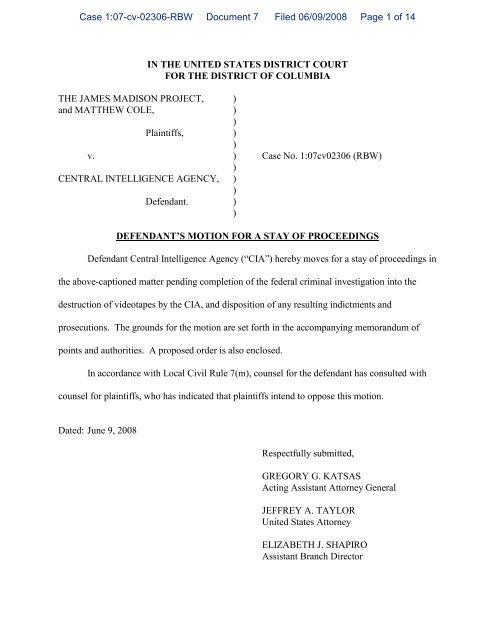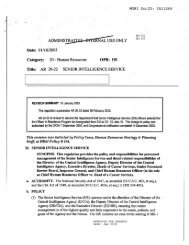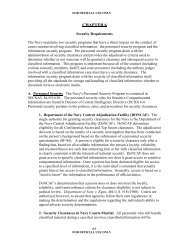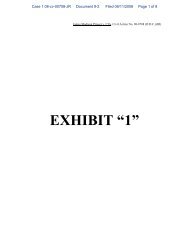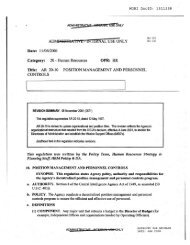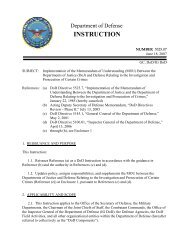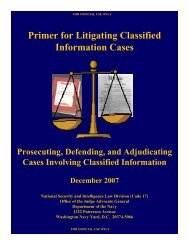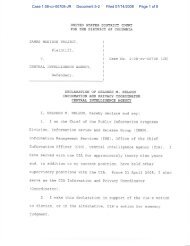File Download: CIA Motion for a Stay of Proceedings
File Download: CIA Motion for a Stay of Proceedings
File Download: CIA Motion for a Stay of Proceedings
Create successful ePaper yourself
Turn your PDF publications into a flip-book with our unique Google optimized e-Paper software.
Case 1:07-cv-02306-RBW Document 7 <strong>File</strong>d 06/09/2008 Page 1 <strong>of</strong> 14<br />
IN THE UNITED STATES DISTRICT COURT<br />
FOR THE DISTRICT OF COLUMBIA<br />
THE JAMES MADISON PROJECT, )<br />
and MATTHEW COLE, )<br />
)<br />
Plaintiffs, )<br />
)<br />
v. ) Case No. 1:07cv02306 (RBW)<br />
)<br />
CENTRAL INTELLIGENCE AGENCY, )<br />
)<br />
Defendant. )<br />
)<br />
DEFENDANT’S MOTION FOR A STAY OF PROCEEDINGS<br />
Defendant Central Intelligence Agency (“<strong>CIA</strong>”) hereby moves <strong>for</strong> a stay <strong>of</strong> proceedings in<br />
the above-captioned matter pending completion <strong>of</strong> the federal criminal investigation into the<br />
destruction <strong>of</strong> videotapes by the <strong>CIA</strong>, and disposition <strong>of</strong> any resulting indictments and<br />
prosecutions. The grounds <strong>for</strong> the motion are set <strong>for</strong>th in the accompanying memorandum <strong>of</strong><br />
points and authorities. A proposed order is also enclosed.<br />
In accordance with Local Civil Rule 7(m), counsel <strong>for</strong> the defendant has consulted with<br />
counsel <strong>for</strong> plaintiffs, who has indicated that plaintiffs intend to oppose this motion.<br />
Dated: June 9, 2008<br />
Respectfully submitted,<br />
GREGORY G. KATSAS<br />
Acting Assistant Attorney General<br />
JEFFREY A. TAYLOR<br />
United States Attorney<br />
ELIZABETH J. SHAPIRO<br />
Assistant Branch Director
Case 1:07-cv-02306-RBW Document 7 <strong>File</strong>d 06/09/2008 Page 2 <strong>of</strong> 14<br />
/s/ Vesper Mei<br />
VESPER MEI<br />
(D.C. Bar No. 455778)<br />
Trial Attorney<br />
United States Department <strong>of</strong> Justice<br />
Civil Division, Federal Programs Branch<br />
Post Office Box 883<br />
Washington, D.C. 20044<br />
Telephone: (202) 514-4686<br />
Facsimile: (202) 616-8470 (fax)<br />
E-mail: vesper.mei@usdoj.gov<br />
Counsel <strong>for</strong> Defendant<br />
-2-
Case 1:07-cv-02306-RBW Document 7 <strong>File</strong>d 06/09/2008 Page 3 <strong>of</strong> 14<br />
IN THE UNITED STATES DISTRICT COURT<br />
FOR THE DISTRICT OF COLUMBIA<br />
THE JAMES MADISON PROJECT, )<br />
and MATTHEW COLE, )<br />
)<br />
Plaintiffs, )<br />
)<br />
v. ) Case No. 1:07cv02306 (RBW)<br />
)<br />
CENTRAL INTELLIGENCE AGENCY, )<br />
)<br />
Defendant. )<br />
)<br />
MEMORANDUM OF POINTS AND AUTHORITIES<br />
IN SUPPORT OF DEFENDANT’S MOTION FOR A STAY OF PROCEEDINGS<br />
INTRODUCTION<br />
This is a Freedom <strong>of</strong> In<strong>for</strong>mation Act (“FOIA”) case seeking documents pertaining to the<br />
Central Intelligence Agency’s (“<strong>CIA</strong>”) destruction <strong>of</strong> videotaped interrogations. After the <strong>CIA</strong>’s<br />
destruction <strong>of</strong> videotapes was made public, the Attorney General directed first a preliminary<br />
inquiry, and then a full criminal investigation into the destruction <strong>of</strong> videotapes. This<br />
investigation is ongoing. The documents that plaintiffs seek in their FOIA requests are closely<br />
related to the questions that the criminal investigation seeks to answer, and the <strong>CIA</strong>’s review and<br />
processing, and any release, <strong>of</strong> these documents, would substantially interfere with the criminal<br />
investigators’ ability to conduct a complete, thorough and untainted federal criminal<br />
investigation into the destruction <strong>of</strong> videotaped interrogations. As a result, the criminal<br />
investigators have requested that the <strong>CIA</strong> seek a stay in this case pending disposition <strong>of</strong> the<br />
criminal investigation, a process that they expect, based on presently available in<strong>for</strong>mation, will<br />
take at least six more months. If indictments and criminal prosecutions result from the<br />
investigation, the investigators would request that the <strong>CIA</strong> seek a further stay <strong>of</strong> the proceeding
Case 1:07-cv-02306-RBW Document 7 <strong>File</strong>d 06/09/2008 Page 4 <strong>of</strong> 14<br />
until the conclusion <strong>of</strong> the criminal proceedings.<br />
BACKGROUND<br />
Plaintiff, The James Madison Project (“JMP”), filed this FOIA suit on December 21,<br />
2007, seeking expedited processing and the release <strong>of</strong> “records in the possession or control <strong>of</strong> the<br />
Central Intelligence Agency (“<strong>CIA</strong>”) pertaining to the 2005 destruction <strong>of</strong> videotapes <strong>of</strong> the<br />
interrogations <strong>of</strong> Zayn Abidin Muhammed Hussain Abu Zubaida (a/k/a Abu Zubaydah) and Abd<br />
al-Rahim al-Nashiri and other suspected terrorists.” Plaintiff’s First Amended Complaint<br />
(“Compl.”) at 1. After JMP amended its complaint to add as a plaintiff Matthew Cole, a<br />
journalist (and to whom the <strong>CIA</strong> had granted expedited processing <strong>for</strong> the identical FOIA<br />
request), the <strong>CIA</strong> filed its answer on February 19, 2008.<br />
The <strong>CIA</strong>’s destruction <strong>of</strong> videotapes was made public on December 6, 2007, with an<br />
announcement by <strong>CIA</strong> Director Michael V. Hayden. Shortly after the destruction <strong>of</strong> the<br />
videotapes was made public, Attorney General Michael Mukasey directed a preliminary inquiry,<br />
and shortly thereafter, on January 2, 2008, a full criminal investigation, into the destruction <strong>of</strong> the<br />
tapes. That criminal investigation has been ongoing, and, because the <strong>CIA</strong>’s processing and<br />
review <strong>of</strong> the documents potentially responsive to plaintiffs’ FOIA request would interfere with<br />
the criminal investigators’ ability “to conduct a complete, thorough, and untainted federal<br />
criminal investigation into the destruction <strong>of</strong> videotaped interrogations” June 9, 2008 Declaration<br />
<strong>of</strong> John H. Durham (“Durham Decl.”) 9, the criminal investigation serves as the basis <strong>for</strong> this<br />
request <strong>for</strong> a stay.<br />
As set <strong>for</strong>th more fully in the Durham Declaration, central questions in the criminal<br />
investigation substantially overlap with in<strong>for</strong>mation contained within the documents sought by<br />
-2-
Case 1:07-cv-02306-RBW Document 7 <strong>File</strong>d 06/09/2008 Page 5 <strong>of</strong> 14<br />
plaintiffs. Durham Decl. 6. In addition, the individuals responsible <strong>for</strong> the review and<br />
processing <strong>of</strong> documents are potential witnesses in the criminal investigation, and their access to<br />
these documents creates the risk that their recollections may be changed as a result <strong>of</strong> their<br />
review. Id. Further, any public disclosures <strong>of</strong> the documents or other in<strong>for</strong>mation sought in this<br />
FOIA case could expose witnesses to versions <strong>of</strong> the events different from their own<br />
recollections, and could cause those witnesses, intentionally or otherwise, to change what they<br />
have to say or to con<strong>for</strong>m their testimony to any such publicly disclosed in<strong>for</strong>mation. Id. 8.<br />
After receiving the plaintiffs’ FOIA request and granting expedited processing in January<br />
2008, the <strong>CIA</strong> began its search <strong>for</strong> responsive documents. While the parties initially hoped to<br />
negotiate a processing and release schedule that would eliminate the need <strong>for</strong> further litigation,<br />
they were unsuccessful. In the meantime, the <strong>CIA</strong> and the criminal investigators realized that<br />
because <strong>of</strong> the overlap between the documents sought by plaintiffs in this litigation as well as the<br />
central questions raised (and the possibility <strong>of</strong> influencing the recollections and testimony <strong>of</strong><br />
potential witnesses) in the criminal investigation, proceeding with plaintiffs’ FOIA request would<br />
interfere with the integrity <strong>of</strong> the criminal investigation. As a result, the criminal investigators<br />
requested that the <strong>CIA</strong> seek a stay <strong>of</strong> the FOIA lawsuit. Based upon presently available<br />
in<strong>for</strong>mation, they estimate that the investigative process will take at least six more months.<br />
Durham Decl. 11. If indictments and criminal prosecutions were to result from the<br />
investigation, they would request that the defendant seek a further stay <strong>of</strong> this proceeding until<br />
the conclusion <strong>of</strong> the criminal proceedings. Id.<br />
-3-
Case 1:07-cv-02306-RBW Document 7 <strong>File</strong>d 06/09/2008 Page 6 <strong>of</strong> 14<br />
ARGUMENT<br />
I. CIVIL ACTIONS RELATING TO A PENDING CRIMINAL INVESTIGATION<br />
ARE COMMONLY STAYED IN ORDER TO AVOID COMPROMISING A<br />
CRIMINAL INVESTIGATION.<br />
This Court has the authority to issue a stay <strong>of</strong> proceedings in this case. As the Supreme<br />
Court has held, “the power to stay proceedings is incidental to the power inherent in every court<br />
to control the disposition <strong>of</strong> the causes on its docket with economy <strong>of</strong> time and ef<strong>for</strong>t <strong>for</strong> itself,<br />
<strong>for</strong> counsel, and <strong>for</strong> litigants.” Landis v. North American Co., 299 U.S. 248, 254 (1936). The<br />
law is well-established, moreover, that this discretionary authority is properly exercised when a<br />
civil action threatens to interfere with a related criminal proceeding. See United States v. Kordel,<br />
397 U.S. 1, 12 n. 27 (1970) (citing cases); SEC v. Dresser Indus., Inc., 628 F.2d 1368, 1375<br />
(D.C. Cir. 1980). This authority allows a court to “stay civil proceedings, postpone civil<br />
discovery or impose protective orders and conditions when the interests <strong>of</strong> justice seem to require<br />
such action.” Dresser, 628 F.2d at 1375. “When a civil proceeding may interfere with a criminal<br />
investigation, it is not uncommon that the United States will seek to stay . . . the civil action in<br />
order to protect the criminal investigation.” United States v. Any and All Assets <strong>of</strong> that Certain<br />
Business Known as Shane Co., 147 F.R.D. 99, 101 (M.D.N.C. 1993) (noting further that such<br />
requests are “presumptively reasonable”). “The decision to stay a civil action pending the<br />
completion or declination <strong>of</strong> a criminal investigation lies within the sound discretion <strong>of</strong> the trial<br />
court.” Horn v. District <strong>of</strong> Columbia, 210 F.R.D. 13, 15 (D.D.C. 2002) (citing cases).<br />
The principle supporting a stay <strong>of</strong> civil proceedings applies throughout the pendency <strong>of</strong> a<br />
criminal investigation, regardless <strong>of</strong> whether an indictment has issued. Thus, numerous courts<br />
have stayed civil proceedings related to ongoing criminal investigations prior to the issuance <strong>of</strong><br />
-4-
Case 1:07-cv-02306-RBW Document 7 <strong>File</strong>d 06/09/2008 Page 7 <strong>of</strong> 14<br />
1<br />
any indictment. See, e.g., St. Paul Fire & Marine Ins. Co., 24 Cl. Ct. 513, 516-17 (Cl. Ct. 1991);<br />
Souza v. Schiltgen, 1996 WL 241824 at *2-*3 (N.D. Cal. 1996); Shane Co., 147 F.R.D. at 102;<br />
Capital Engineering & Manufacturing Co., Inc. v. Weinberger, 695 F. Supp. 36, 41-42 (D.D.C.<br />
1988); Integrated Generics, Inc. v. Bowen, 678 F. Supp. 1005, 1009 (E.D.N.Y. 1988); United<br />
States v. Hugo Key & Son, 672 F. Supp. 656, 657-59 (D. R.I. 1987); Larouche Campaign v. FBI,<br />
106 F.R.D. 500, 501-02 (D. Mass. 1985).<br />
When warranted, stays to protect pending criminal investigations may apply to suspend<br />
all proceedings in a civil case. See, e.g. St. Paul Fire & Marine Ins. Co., 24 Cl. Ct. at 516-17;<br />
Souza, 1996 WL 241824 at *2-*3; Integrated Generics, Inc., 678 F. Supp. at 1009; Hugo Key &<br />
Son, 672 F. Supp. at 657-59; see also, e.g., Hatfill v. Ashcr<strong>of</strong>t, Civil Action No. 03-1793<br />
(D.D.C.) (Walton, J.) (Minute Entry dated March 29, 2004); Alexander v. Federal Bureau <strong>of</strong><br />
Investigation, Civil Action No. 96-2123 (D.D.C.) (Lamberth, J.) (Docket No. 13). The Dresser<br />
court identified as relevant considerations the prospect that either the defense or the prosecution<br />
might obtain discovery that would not ordinarily be available in a criminal case; the possibility<br />
1<br />
While some courts have stated that stays should generally be denied in the absence <strong>of</strong> an<br />
indictment, these statements have come in the context <strong>of</strong> cases where the stay is sought not at the<br />
behest <strong>of</strong> the government investigators or prosecutors, but rather the moving party is the party<br />
under investigation in the related criminal proceeding, and thus where self-incrimination dangers,<br />
rather than threats to effective law en<strong>for</strong>cement, are the operative concern. Compare Hicks v.<br />
New York, 268 F. Supp. 2d 238, 242 (E.D.N.Y. 2003) (“[A] court will generally deny a stay<br />
where no indictment has been issued against the proponent <strong>of</strong> the stay.”) (emphasis added) with<br />
Baranski v. Fifteen Unknown Agents <strong>of</strong> ATF, 195 F. Supp. 2d 862, 870-71 (W.D. Ky. 2002)<br />
(granting government’s pre-indictment motion <strong>for</strong> stay, distinguishing cases where party under<br />
investigation is stay movant). Moreover, even where the party under investigation is the stay<br />
movant, some courts have rejected a general rule against pre-indictment stays. See, e.g., White v.<br />
Mapco Gas Products, 116 F.R.D. 498, 502 n.4 (E.D. Ark. 1987) (“That an indictment has not yet<br />
been returned does not make consideration <strong>of</strong> the motion <strong>for</strong> a stay any less appropriate.”) (citing<br />
Brock v. Tolkow, 109 F.R.D. 116, 120 n.2 (E.D.N.Y. 1985)).<br />
-5-
Case 1:07-cv-02306-RBW Document 7 <strong>File</strong>d 06/09/2008 Page 8 <strong>of</strong> 14<br />
that Fifth Amendment issues would be implicated; the chance that a criminal defendant’s theory<br />
<strong>of</strong> defense would be revealed prematurely; or the risk that the criminal matter would be otherwise<br />
prejudiced. Dresser, 628 F.2d at 1376. Factors <strong>for</strong> a court to consider in deciding whether such a<br />
stay is warranted are: whether the two matters involve related issues, whether a stay would or<br />
would not create hardship or inconvenience <strong>for</strong> the courts or the parties, and whether the duration<br />
<strong>of</strong> a stay is reasonable. See, e.g., United States ex rel. Westrick v. Second Chance, 2007 WL<br />
1020808 (D.D.C. 2007); St. Paul Fire and Marine Ins.<br />
II.<br />
A STAY OF THIS CIVIL FOIA CASE IS WARRANTED.<br />
A. The Pending Criminal Investigation into the <strong>CIA</strong>’s Destruction <strong>of</strong><br />
Certain Videotaped Interrogations <strong>of</strong> Detainees Is Closely Related to<br />
this FOIA Case and Could Be Harmed if the FOIA Case Proceeded.<br />
In deciding whether to stay civil proceedings in light <strong>of</strong> a pending criminal investigation,<br />
a key issue is the risk <strong>of</strong> prejudice to the investigation due to its relation to the civil case. Estate<br />
<strong>of</strong> Gaither v. District <strong>of</strong> Columbia, 2005 WL 3272130, *3 (D.D.C. 2005). In this case, plaintiffs’<br />
FOIA requests seek documents “pertaining to the 2005 destruction <strong>of</strong> videotapes <strong>of</strong> the<br />
interrogations <strong>of</strong> Zayn Abidin Muhammed Hussain Abu Zubaida (a/k/a Abu Zubaydah) and Abd<br />
al-Rahim al-Nashiri and other suspected terrorists.” Compl. at 1. Each <strong>of</strong> the five categories <strong>of</strong><br />
documents that plaintiffs seek in their requests relate directly to the destruction <strong>of</strong> the videotapes,<br />
broadly seeking documents relating to communications with Congress about the videotapes;<br />
records “received as part <strong>of</strong> any criminal prosecutions that sought acknowledgment <strong>of</strong> the<br />
existence and/or copies <strong>of</strong> videotape interrogations <strong>of</strong> terrorist suspects since September 11,<br />
2001"; and records pertaining to “the identity <strong>of</strong> the attorney within your Agency’s Office <strong>of</strong><br />
General Counsel who approved the destruction <strong>of</strong> the videotapes and any records setting <strong>for</strong>th the<br />
-6-
Case 1:07-cv-02306-RBW Document 7 <strong>File</strong>d 06/09/2008 Page 9 <strong>of</strong> 14<br />
policy or legal analysis underlying that conclusion.” See Compl. 22.<br />
Plaintiffs’ FOIA requests substantially overlap with questions central to the ongoing<br />
federal criminal investigation into the destruction <strong>of</strong> the videotapes. As set <strong>for</strong>th in the Durham<br />
Declaration, the criminal investigation is broad, essentially looking into all aspects <strong>of</strong> the<br />
destruction <strong>of</strong> the videotaped interrogations, including whether anyone obstructed justice, made<br />
false statements, or acted in contempt <strong>of</strong> court or Congress in connection with the destruction <strong>of</strong><br />
the videotapes. Durham Decl. 4. These inquiries involve questions about who knew <strong>of</strong> the<br />
videotaped interrogations, who was aware <strong>of</strong> the various orders that might have required their<br />
preservation, and who was involved, in any way, in the decision and/or directive to destroy the<br />
videotapes. Id. 6. Clearly, every category <strong>of</strong> plaintiffs’ FOIA requests is intertwined with the<br />
inquiries involved in the federal criminal investigation. Moreover, as set <strong>for</strong>th more fully in the<br />
Durham Declaration, because the review and processing <strong>of</strong> the documents potentially responsive<br />
to plaintiffs’ FOIA requests will be done by individuals who are potential (and essential)<br />
witnesses in the investigation, such review and processing could well prejudice the criminal<br />
investigation by causing these witnesses to, unintentionally or intentionally, change their<br />
testimony to con<strong>for</strong>m their version <strong>of</strong> events to the documents. Id. 7. Moreover, to the extent<br />
that any public release <strong>of</strong> responsive documents or in<strong>for</strong>mation contained within may occur, such<br />
a release could also affect the recollections and testimony <strong>of</strong> witnesses <strong>for</strong> the investigation. Id. <br />
8. Thus, the close relationship between this civil FOIA case and the ongoing federal criminal<br />
investigation into the destruction <strong>of</strong> the videotapes favors a stay <strong>of</strong> this FOIA case.<br />
B. The <strong>Stay</strong> Would Not Create a Hardship <strong>for</strong> the Plaintiffs.<br />
Plaintiff JMP is a non-pr<strong>of</strong>it corporation “with the primary purpose <strong>of</strong> educating the<br />
-7-
Case 1:07-cv-02306-RBW Document 7 <strong>File</strong>d 06/09/2008 Page 10 <strong>of</strong> 14<br />
public on issues relating to intelligence gathering and operations, secrecy policies, national<br />
security and government wrongdoing.” Compl. 3. Plaintiff Matthew Cole is an investigative<br />
journalist who is currently writing a book about the <strong>CIA</strong>. Id. 4. The plaintiffs made their FOIA<br />
requests and seek the documents in order to “contribute to the public’s understanding <strong>of</strong><br />
government operations or activities.” December 9, 2007 letter from Mark S. Zaid to Scott A.<br />
Koch (Ex. A) at 3; December 27, 2007 letter from Mark S. Zaid to Scott A. Koch (Ex. B) at 2.<br />
They also apparently seek to allow the public to make its own evaluation <strong>of</strong> the <strong>CIA</strong>’s destruction<br />
<strong>of</strong> the tapes, stating:<br />
Not only does the destruction <strong>of</strong> the tapes have the potential to serve, either by<br />
appearance or in reality, as evidence <strong>of</strong> inappropriate or unlawful ef<strong>for</strong>ts by the<br />
<strong>CIA</strong> to destroy evidence, but it also raises the possibility <strong>of</strong> whether the <strong>CIA</strong> and<br />
its <strong>of</strong>ficials, particularly those within its Office <strong>of</strong> General Counsel, knowingly<br />
and willingly obstructed justice. It goes without saying that potential criminal<br />
actions by the <strong>CIA</strong> and its <strong>of</strong>ficials are ‘relevant to a subject <strong>of</strong> public urgency’<br />
and there<strong>for</strong>e satisfy the ‘compelling need’ standard.<br />
Ex. A at 3-4; Ex. B at 3. In short, plaintiffs seek these documents in order to provide in<strong>for</strong>mation<br />
to the public, and the questions that plaintiffs believe these documents would answer<br />
substantially overlap with the very questions the criminal investigators hope to answer. Cf.<br />
Durham Decl. 4 (“The questions under active review in this investigation include, inter alia,<br />
whether any federal criminal <strong>of</strong>fenses were committed in connection with the destruction <strong>of</strong> the<br />
above-referenced videotapes. More specifically, the investigation team is actively reviewing<br />
whether any person or persons obstructed justice, made false statements, or acted in contempt <strong>of</strong><br />
court or Congress in connection with the destruction <strong>of</strong> the videotapes. With respect to potential<br />
obstruction <strong>of</strong> justice <strong>of</strong>fenses, we are investigating whether the destruction <strong>of</strong> the videotapes<br />
violated any order issued by any federal judicial <strong>of</strong>ficer and, if so, what the person or persons’<br />
-8-
Case 1:07-cv-02306-RBW Document 7 <strong>File</strong>d 06/09/2008 Page 11 <strong>of</strong> 14<br />
knowledge, motive, and/or intent was in destroying the tapes or causing their destruction.”).<br />
The public’s interest in the integrity <strong>of</strong> the criminal investigation, however, takes priority<br />
over the plaintiffs’ interest in disseminating in<strong>for</strong>mation (even to the public) that would squarely<br />
implicate the integrity <strong>of</strong> that investigation, and, to the extent that plaintiffs’ FOIA requests are<br />
made in the public interest, that interest will be vindicated through the criminal investigation<br />
(and any subsequent release <strong>of</strong> documents in this FOIA case or otherwise). Public policy “gives<br />
priority to the public interest in law en<strong>for</strong>cement.” Benevolence Int’l Found., Inc., 200 F. Supp.<br />
2d at 941 (quoting Campbell, 307 F.2d at 487); see also Jones v. City <strong>of</strong> Indianapolis, 216 F.R.D.<br />
440, 452 (S.D. Ind. 2003) (“The public also has an important interest in a potential, untainted<br />
criminal prosecution.”); Baranski v. Fifteen Unknown Agents <strong>of</strong> ATF, 195 F. Supp. 2d 862, 870<br />
(W.D. Ky. 2002) (finding that the public interest served by protecting the integrity <strong>of</strong> a criminal<br />
investigation outweighed the plaintiff’s interest in pursuing the civil action); Walsh Sec., Inc. v.<br />
Cristo Prop. Mgmt., Ltd., 7 F. Supp. 2d 523, 529 (D.N.J. 1998) (holding that a unimpeded<br />
criminal investigations “benefit the public”); Bureerong v. Uvawas, 167 F.R.D. 83, 87 (C.D.<br />
Cal. 1996) (“[T]he interests <strong>of</strong> the Government in protecting its criminal investigation are clearly<br />
the paramount concern here.”); Hugo Key & Son, Inc., 672 F. Supp. at 658-59 (“[T]his court is<br />
compelled to acknowledge the greater weight <strong>of</strong> [the government’s] interest in determining the<br />
priority <strong>of</strong> the criminal action.”). Given the circumstances described herein, and in the<br />
accompanying declaration, a stay in deference to the ongoing investigation is warranted here.<br />
Moreover, with respect to any documents falling within the scope <strong>of</strong> the investigation –<br />
which would include virtually all <strong>of</strong> the documents sought by plaintiffs, those documents would<br />
be exempt from release under FOIA Exemption 7(A), which covers:<br />
-9-
Case 1:07-cv-02306-RBW Document 7 <strong>File</strong>d 06/09/2008 Page 12 <strong>of</strong> 14<br />
records or in<strong>for</strong>mation compiled <strong>for</strong> law en<strong>for</strong>cement purposes, but only to the<br />
extent that the production <strong>of</strong> such law en<strong>for</strong>cement records or in<strong>for</strong>mation (A)<br />
could reasonably be expected to interfere with en<strong>for</strong>cement proceedings.<br />
5 U.S.C. § 552(b)(7)(A).<br />
Exemption 7(A) applies as long as there is a concrete prospect <strong>of</strong> a law en<strong>for</strong>cement<br />
proceeding that could be harmed by a premature release <strong>of</strong> in<strong>for</strong>mation. See NLRB v. Robbins<br />
Tire & Rubber Co., 437 U.S. 214, 232 (1978); Campbell v. HHS, 682 F.2d 256, 259 (D.C. Cir.<br />
1982). Accordingly, a court will uphold an agency’s invocation <strong>of</strong> Exemption 7(A) if the agency<br />
can show that: (1) a law en<strong>for</strong>cement proceeding is pending or prospective, and (2) release <strong>of</strong> the<br />
in<strong>for</strong>mation could reasonably be expected to cause some articulable harm. See Robbins Tire,<br />
437 U.S. at 228-32. In this case, as set <strong>for</strong>th in the Durham Declaration, the criminal<br />
investigation and any subsequent indictments or prosecutions would qualify as pending law<br />
en<strong>for</strong>cement proceedings, and, as discussed above, the search <strong>for</strong>, processing, and release <strong>of</strong> the<br />
in<strong>for</strong>mation contained in the documents would harm that investigation. As a result, even were<br />
this Court to deny defendant’s <strong>Motion</strong> to <strong>Stay</strong>, the <strong>CIA</strong> would assert Exemption 7(A) over the<br />
documents, and, if this Court were to uphold that assertion, plaintiffs still would not receive the<br />
2<br />
documents be<strong>for</strong>e the conclusion <strong>of</strong> the investigation and any resulting criminal proceedings.<br />
Plaintiffs will not be harmed by a stay <strong>of</strong> proceedings here.<br />
2<br />
Nor would a blanket assertion <strong>of</strong> Exemption 7(A) by the defendant resolve the problem.<br />
Under Maydak v. Dep’t <strong>of</strong> Justice, 218 F.3d 760 (D.C. Cir. 2000), the <strong>CIA</strong> must review and<br />
process all <strong>of</strong> the documents <strong>for</strong> all applicable exemptions at the same time, necessitating the<br />
same problems with review by potential witnesses to the investigation that would otherwise<br />
occur.<br />
-10-
Case 1:07-cv-02306-RBW Document 7 <strong>File</strong>d 06/09/2008 Page 13 <strong>of</strong> 14<br />
C. Judicial Economy and the Temporary Nature <strong>of</strong> the <strong>Stay</strong> Sought Favor A<br />
<strong>Stay</strong>.<br />
As set <strong>for</strong>th above, were this Court to deny defendant’s <strong>Motion</strong> <strong>for</strong> <strong>Stay</strong>, the <strong>CIA</strong> would<br />
likely invoke Exemption 7(A) over most, if not all, <strong>of</strong> the documents sought by plaintiffs in their<br />
FOIA requests pending the conclusion <strong>of</strong> law en<strong>for</strong>cement proceedings. At that point, unless the<br />
plaintiffs conceded the propriety <strong>of</strong> Exemption 7(A), the parties would have to litigate whether<br />
that exemption applied to the documents in question, and this Court would have to decide that<br />
issue, likely resulting in the plaintiffs’ inability to obtain responsive documents until the<br />
conclusion <strong>of</strong> criminal proceedings in any case. Once no further possibility <strong>of</strong> interference with<br />
such proceedings existed, however, the Exemption 7(A) issue would be moot, this Court would<br />
not have to decide the issue, and the documents (or portions <strong>of</strong> documents) withheld only under<br />
Exemption 7(A) would be released.<br />
Moreover, the time requested <strong>for</strong> a stay is reasonable. The duration <strong>of</strong> the investigation is<br />
not indefinite; rather, the criminal investigators estimate, based upon presently available<br />
in<strong>for</strong>mation, that the remainder <strong>of</strong> the investigatory process will take at least six more months,<br />
and, if no indictments are issued at the conclusion <strong>of</strong> that process, the stay could be lifted at that<br />
time. If indictments and prosecutions were to result from the investigation, the Speedy Trial Act<br />
will appropriately expedite a criminal trial. See St. Paul and Marine Ins. Co., 24 Cl. Ct. at 517.<br />
CONCLUSION<br />
For the <strong>for</strong>egoing reasons, the <strong>CIA</strong> requests that this Court grant a six-month stay, at the<br />
conclusion <strong>of</strong> which the defendant will update the Court on the status <strong>of</strong> the investigation.<br />
Dated: June 9, 2008<br />
-11-
Case 1:07-cv-02306-RBW Document 7 <strong>File</strong>d 06/09/2008 Page 14 <strong>of</strong> 14<br />
Respectfully submitted,<br />
GREGORY G. KATSAS<br />
Acting Assistant Attorney General<br />
JEFFREY A. TAYLOR<br />
United States Attorney<br />
ELIZABETH J. SHAPIRO<br />
Assistant Branch Director<br />
/s/ Vesper Mei<br />
VESPER MEI<br />
(D.C. Bar No. 455778)<br />
Trial Attorney<br />
United States Department <strong>of</strong> Justice<br />
Civil Division, Federal Programs Branch<br />
Post Office Box 883<br />
Washington, D.C. 20044<br />
Telephone: (202) 514-4686<br />
Facsimile: (202) 616-8470 (fax)<br />
E-mail: vesper.mei@usdoj.gov<br />
Counsel <strong>for</strong> Defendant<br />
-12-


